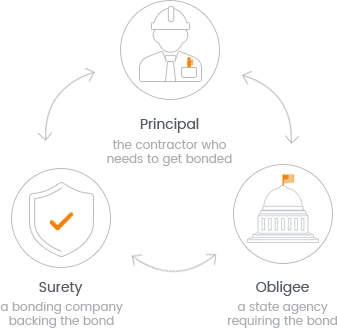What Contractors Should Know About HVAC Surety Bonds.
HVAC
Bonds: What Contractors Need to Know
Construction contractors whose work involves repairing,
maintaining, or installing
heating,
ventilating, and air conditioning (HVAC)
systems need to understand their bonding and licensing
requirements. Many states require HVAC contractors to be
licensed and bonded. Even in states that do not require
HVAC licenses, local governments might. HVAC bonds are
commonly required as a condition of licensing by state
and local governments. Here is some information about
HVAC bonds that contractors need to understand.
 What
Is an HVAC Bond? What
Is an HVAC Bond?
An HVAC
bond is a type of license surety bond that is commonly
required by state or local licensing bodies before a
contractor can obtain a license to work as an HVAC
contractor. Surety bonds are legal contracts through
which the following three parties agree on how risk will
be handled:
•
Principal - The contractor who is required to post
the bond
•
Obligee - The state or local licensing body that
requires the contractor to post the bond
•
Surety - The bond company that issues the bond to
guarantee the principal's ethical business operations
and compliance with the law
While
some contractors confuse surety bonds with insurance,
there are distinct differences. Insurance policies
transfer risk from the policyholder to the insurance
company and protect the insured against liability in the
event of a loss. By contrast, a surety bond protects the
public from the bondholder's potential malfeasance and
assigns the risk to the contractor rather than the
public.
Story
continues below ↓
When an HVAC bond is issued, the contractor will have to
sign an
indemnification agreement
with the surety. This is an agreement by which the
contractor agrees to hold the bond company harmless if a
bond claim is filed. If the HVAC contractor breaks the
law or violates their contractual duties, any party
harmed by the contractor's actions can file a claim
against the bond. The surety company will investigate
the filed claim to determine whether it is valid. If it
is, the bond company will pay the claim. However, the
indemnification agreement will require the contractor to
repay the surety in full or face legal action.
Why
Are HVAC Bonds Required?
Government licensing agencies require HVAC bonds to
ensure that the contractors they license are qualified
to perform the work, have the required training and
education, and have stable businesses. HVAC bonds
protect the public from potential misconduct and shoddy
work. They also help to ensure that HVAC professionals
will comply with all of the regulations and laws that
govern the HVAC industry. Since both licenses and surety
bonds expire, the surety bond requirement means that
HVAC contractors who want to renew their licenses will
also have to renew their bonds. If a contractor has
violated the conditions and terms of the bond, the
surety company might not renew it. This can help the
licensing authority by screening out contractors whose
licenses should not be continued.
How Do You Get an HVAC
Bond?
Contractors who have completed the training and
education requirements in their states for becoming an
HVAC contractor can apply for an
HVAC bond through a surety company.
Many bond companies have online application processes
that allow contractors to submit their applications
online. The surety company might also ask the contractor
to submit additional documentation about themselves,
their credit, their business, and their experience.
Once
the application and accompanying materials are
submitted, the surety company will review everything
during an underwriting process. HVAC bond underwriters
evaluate the applicant's credit, business experience,
reputation in the industry, and other factors to assess
the level of risk the surety company would take on if it
approved the bond application. If the underwriters
determine the contractor poses a low level of risk, the
bond application will likely be approved. By contrast,
if the contractor is determined to pose a high level of
risk, the bond application might be denied.
How Much Do HVAC Bonds
Cost?
How much an HVAC bond will cost depends on the posted
amount your state or local government requires and the
degree of risk you are deemed to pose. However, you
won't have to pay the face value of the required bond.
Instead, you will have to pay a
bond premium,
which is a small percentage of the bond's maximum value.
If you
have great credit, strong business financials,
experience, and a solid reputation with others you've
worked with in the past, you can anticipate being
assessed as carrying a low level of risk. In that case,
your surety bond premium quote might be as low as 1% of
the bond's maximum amount. For example, if your state
requires you to post a $15,000 HVAC bond to get your
license, a 1% premium would mean you would have to pay
$150 to purchase your bond.
If you
have a low credit score, little experience, poor
financials, or a problematic reputation, your level of
risk might be assessed as high. In that case, the surety
company might deny your bond application. If it's
approved, you might be required to post a higher premium
of 10% or more. In the case of a $15,000 bond, this
means you might have to post up to $1,500 or more to
secure your bond.
Bond Renewals
Like
HVAC licenses, HVAC bonds expire every year or two.
Instead, you will need to renew both your bond and your
license according to the schedule required by your state
and bond company. It is a good idea to begin the renewal
process early to make sure your bond and license don't
lapse. If your bond expires without being renewed, your
license could be suspended and prevent you from legally
operating your business.
While
having to pay a premium to renew your bond and a renewal
license application fee every year or two might seem
excessive, you can reduce your surety bond costs by
improving your credit and avoiding bond claims. If you
had to pay a higher premium to obtain your bond
initially but have since taken steps to increase your
credit score, you might secure a lower rate when it's
time to renew your bond. This provides an incentive for
you to operate your business ethically, follow the law,
and maintain a good credit score.
Being
aware of the HVAC surety bond requirements that affect
you and making sure to comply with them can give you
peace of mind, contribute to building a strong
reputation, and help your business thrive.
Author Name:
Todd Bryant
Author Bio:
Todd Bryant is a graduate of Germantown
Academy and the University of Pittsburgh College of
Business Administration Honors College. He has been
President of
Bryant Surety Bonds, Inc., an A+ rated Business with
the Better Business Bureau, since 2007. Licensed as a
producer with the Department of Insurance, he has been
published in the National Association of Surety Bond
Producers newsletter and on numerous authoritative
publications such as The Washington Post,
Entrepreneur.com, Azcentral.com and many more.
###
|
